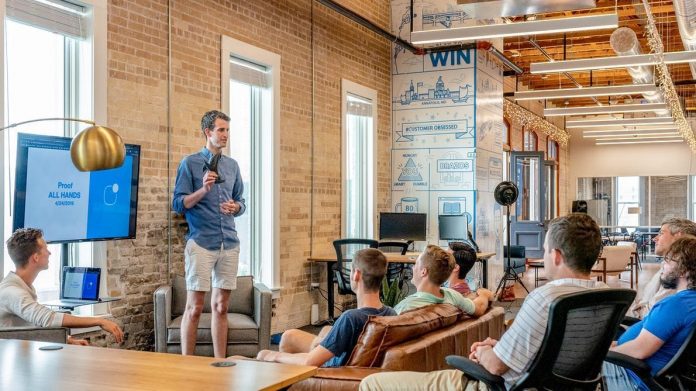With over 500 unicorn companies worldwide with a total valuation of over $1.8 trillion, it’s easy to forget that some of these juggernauts started as tiny startups. While 11 out of 12 startups fail, success stories continue to inspire thousands of entrepreneurs to bring their ideas to life, provide innovative solutions, and carve new niches. A minimum viable product (MVP) has become a staple of startup evolution, and an MVP development company — an irreplaceable partner on the journey to success. Let’s look at five inspiring examples of turning a minimum viable product into a long-term profit driver.
Foursquare
Naveen Selvadurai and Dennis Crowley had check-in solution experience in spades after creating and selling their SMS-based solution called Dodgeball to Google. And once they realized smartphones were here to stay, the founders came up with an idea for a check-in app.
Even with sufficient VC funding, Crowley and Selvadurai knew to start with an MVP. They launched a single-feature app that offered simple functionality for checking in backed by a basic gamification reward system. Besides, Foursquare relied on third-party solutions to substitute the lack of functionality in the first releases. For instance, Google’s cloud solutions were used to collect user feedback to speed up development. New features, like City Guides and Recommendations, appeared much later, after the app became popular.
Once other social platforms integrated the check-in features, Foursquare pivoted towards providing location intelligence services to businesses. In 2019, Factual, Placed, and Foursquare merged into a single location technology platform to consolidate their resources and solutions. The current Foursquare offers include developer (Pilgrim SDK) and measurement (Pinpoint) solutions.
Dropbox
Dropbox is an example straight out of startup history books, or at least The Lean Startup by Eric Ries. Drew Houston wanted to tackle one of the biggest drawbacks of cloud services and make them easy to use, intuitive, and pain-free. 
Instead of sinking resources into development, Houston came up with a simple MVP — a short animated video demonstrating the file synchronization functionality of the future app. Coupled with a landing page, this neat validation approach helped the team collect over 70,000 emails from the people interested in trying Dropbox. Confirming the existing demand, the team went to develop the app, limiting the initial feature set. Unsurprisingly, the app became popular enough to gain Apple’s interest, even though Houston chose to keep the business independent.
The number of Dropbox users exceeded 600 million as of the third quarter of 2019. And over 14 million of those are paying customers, each bringing in over $100 of revenue on average. It is also the second most popular file sharing platform globally, closely following Imgur.
Virgin Atlantic
A canceled flight, $2,000, and a couple of hours lead to the first spur-of-the-moment flight of Virgin Airlines. Richard Branson was hoping for a vacation in Puerto Rico with his fiancee, but they got stranded in an airport with hundreds of fellow travelers. Instead of rescheduling the trip, Branson chartered a plane for $2,000 and went around the airport with a board advertising a replacement flight by Virgin Airlines. In a few short hours, he sold out the tickets for $39 apiece and made it to his destination.
While Branson did not immediately go into the airline business, he learned a couple of valuable lessons and entered the market in 1984 with Virgin Atlantic and Virgin Cargo. A year later, the business group expanded to include Virgin Holiday, and 2004 saw Virgin Galactic’s inception.
Unfortunately, the 2020 pandemic has hit the travel and tourism industry the hardest, as is demonstrated by a 70% decrease in revenue seen since the beginning of the crisis. Virgin Atlantic had to initiate layoffs and file for bankruptcy protection, which resulted in debt restructuring and a £1.2 billion rescue package.
Groupon
Coupons and deals were far removed from Andrew Mason’s initial idea. The Point was to become a change-inducing platform that would enable people to enact changes they couldn’t perform on their own. However, months of research and implementation resulted in an epic flop. 
After the failure, Mason repurposed the website’s blog to create The Daily Groupon — a collection of coupons by local businesses. To minimize expenses, he posted the deals and sent out emails with coupon PDFs manually. The process was time-consuming, limiting the number of potential users. Still, this MVP proved the concept to be successful and enabled the team to collect valuable feedback and user data to improve the new version of Groupon.
As of 2021, Groupon is within the top-5 of the most popular online coupon and rebate websites, with over 23 million daily visits.
Glovo
Sacha Michaud and Oscar Pierre met at the end of 2014 in Barcelona and realized their ideas were close enough to create a partnership. Instead of following the on-demand economy’s vertical development pattern, they wanted to create something magical and let anyone get anything within one hour.
Speed was at the core of Glovo’s success. The entrepreneurs relied on an initial investment of €100,000 and a few months of development to launch a simple app for iOS. The first order came in March 2015, and within a month, the company had too many clients to serve, so the founders had to leave the office and trek around Barcelona to keep customers happy. The accelerated approach worked in their favor, and Glovo managed to raise €1.5 million in six months after the initial launch.
As of 2021, Glovo operates across 21 countries and relies on nearly 60,000 couriers to deliver anything to 7+ million active customers. While it isn’t as popular as Uber Eats or DoorDash, Glovo is on a steady rise.
These five outstanding companies prove that a way to global success starts with a minimum viable product, regardless of the niche. Sometimes all you need is an explanatory video, a single-feature app, or a blog to validate your idea, gain traction, and attract investors.

